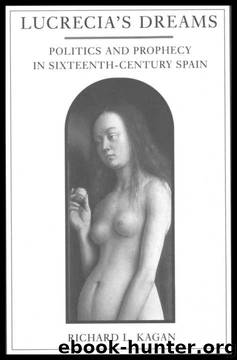Lucrecia's Dreams: Politics and Prophecy in Sixteenth-Century Spain by Richard L. Kagan

Author:Richard L. Kagan
Language: eng
Format: epub
Published: 2010-02-09T12:16:00+00:00
Guillen de Casaos
Allende's closest collaborator was the astrologer Guillen de Casaos. Born in 1541, Casaos belonged to an important hidalgo family originally from Seville. His father had served as governor in Nicaragua and Costa Rica. Casaos was similarly attracted to the New World. Trained as a soldier, he initially served as an infantry captain in Andalucia, but in 1577 he was appointed captain general of the Yucatan, an important position that he exercised for seven years. In 1583 Casaos took leave of his wife and returned to Madrid in order to gain royal support for a planned expedition to New Mexico." Philip, however, was preoccupied with European affairs and so Casaos was obliged to join the throng of petitioners milling around the royal court.
While he waited, Casaos began writing a series of arbitrios to the king about "his honor and hacienda" as well as "matters touching on the government of the realm, including what should be done in the planned armada to England."" In the form of a long poem, Casaos reminded Philip of his responsibilities to his subjects, likening the monarch to a pastor charged with the welfare of his flock. "The defense of the realm depends less on soldiers than upon justice, equity, and well-treated vassals," Casaos wrote, and the tone of the poem suggests that he, too, had by the late 1580s lost faith in Philip's ability to rule.83
By 1587 Allende was already serving as Casaos's confessor. The two had apparently met in 1586, discovered their mutual interest in astrology and prophecy, and quickly become friends." The two also shared a fascination with visions, a phenomenon Casaos claimed to have experienced firsthand. His visions, he explained at his trial, had begun in 1574 and continued after his arrival in New Spain. In 1583 he had had a vision of his mother, "white like a cloud and blessing him," which he took as a sign of her death. When this premonition was later confirmed by letter, he thought that the vision might have had a divine source. His other visions and dreams, especially those he experienced while in Madrid, pertained to "more substantial" topics, notably "matters of government" and the "bad government" (mal gobierno) of Spain. In a dream he had in 1585, which he attempted to relate to the king, he heard a voice announce that Philip would become ill during his forthcoming trip to Aragon. Some of his dreams were apocalyptic, concerning "the chastisement of the world, but not its people," but most had political content, including mention of the corruption of the representatives of the cities at the Cortes, the death of Henry III of France, and the defeat of the Armada."
Casaos's letters to the king were ignored and his plans for expeditions to northern Mexico were shelved. Like Mendoza and Allende, then, Casaos had both personal and political grievances against Philip and a marked antipathy toward the royal ministers. Philip's government was inherently corrupt, or as Lucrecia testified, the three of them once agreed that "everything about the king is wrong, even the time of His Majesty's three clocks.
Download
This site does not store any files on its server. We only index and link to content provided by other sites. Please contact the content providers to delete copyright contents if any and email us, we'll remove relevant links or contents immediately.
| Africa | Americas |
| Arctic & Antarctica | Asia |
| Australia & Oceania | Europe |
| Middle East | Russia |
| United States | World |
| Ancient Civilizations | Military |
| Historical Study & Educational Resources |
In Cold Blood by Truman Capote(3375)
The Innovators: How a Group of Hackers, Geniuses, and Geeks Created the Digital Revolution by Walter Isaacson(3158)
Steve Jobs by Walter Isaacson(2889)
All the President's Men by Carl Bernstein & Bob Woodward(2369)
Lonely Planet New York City by Lonely Planet(2218)
And the Band Played On by Randy Shilts(2197)
The Room Where It Happened by John Bolton;(2151)
The Poisoner's Handbook by Deborah Blum(2135)
The Innovators by Walter Isaacson(2098)
The Murder of Marilyn Monroe by Jay Margolis(2095)
Lincoln by David Herbert Donald(1982)
A Colony in a Nation by Chris Hayes(1927)
Being George Washington by Beck Glenn(1922)
Under the Banner of Heaven: A Story of Violent Faith by Jon Krakauer(1789)
Amelia Earhart by Doris L. Rich(1690)
The Unsettlers by Mark Sundeen(1682)
Dirt by Bill Buford(1671)
Birdmen by Lawrence Goldstone(1662)
Zeitoun by Dave Eggers(1643)
